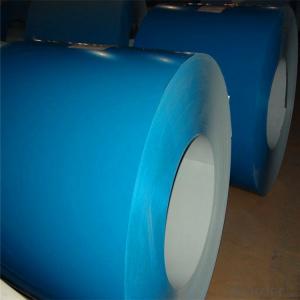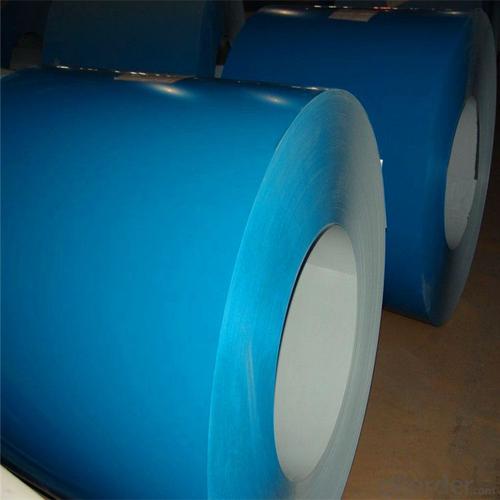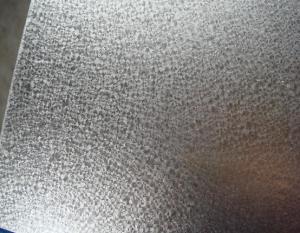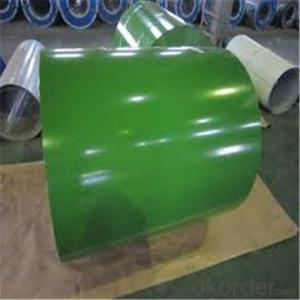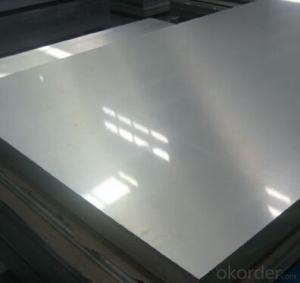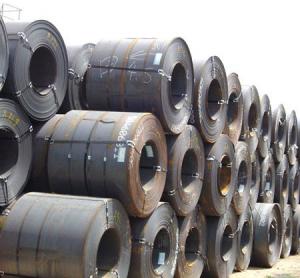Hot Dipped Aluzinc Galvanized Steel Coil
- Loading Port:
- Tianjin
- Payment Terms:
- TT OR LC
- Min Order Qty:
- 100 m.t.
- Supply Capability:
- 500000 m.t./month
OKorder Service Pledge
OKorder Financial Service
You Might Also Like
Specification
Hot Dipped Aluzinc Galvanized Steel Coil
Description of Hot Dipped Aluzinc Galvanized Steel Coil
Product | PPGI/PPGL |
Capacity | 5,000 tons/month |
Base material | Hot dipped galvanized steel |
Thickness | 0.2-2.0mm |
Width | 600-1250mm(according to your need) |
Coil Weight | 3-6tons |
Quality | SGCC, DX51D |
Color | RAL No. or customers samples’ color |
Zinc-coating | 30g/m2-180g/m2 |
Coil ID | 508mm/610mm |
Technique | Cold rolled—hot dipped galvanized—color coated |
Painting | Top painting:15~25μm |
Back painting: 6~10μm | |
Tolerance | Thickness: +/-0.02mm |
Width:+/-2mm | |
Shipment time | within 15-45 workdays |
Payment | T/T, L/C at sight |
Packing | Standard export packing |
The special order can be negotiated. | |
Application of Hot Dipped Aluzinc Galvanized Steel Coil
APPLICATION OF OUR PREPAINTED STEEL | ||||||||||
Construction | Outside | Workshop,agricultural warehouse,residential precast unit | ||||||||
corrugated roof,roller shutter door,rainwater drainage pipe,retailer booth | ||||||||||
Inside | Door,doorcase,light steel roof stucture,folding screen,elevator,stairway,ven gutter,Construction Wall | |||||||||
Electrical applicance | Refrigerator,washer,switch cabnet,instrument cabinet,air conditioning,micro-wave owen,bread maker | |||||||||
Fuiniture | Central heating slice,lampshade,chifforobe,desk,bed,locker,bookself | |||||||||
Carrying trade | Exterior decoration of auto and train,clapboard,container,isolation lairage,isolation board | |||||||||
Qthers | Writing panel,garbagecan,billboard,timekeeper,typewriter,instrument panel,weight sensor,photographic equipment | |||||||||
Products Show of Hot Dipped Aluzinc Galvanized Steel Coil

Product Advantages
1.With nearly 20 years experience in prepainted steel, accommodate different marketdemands. | ||||||||||||||
2.'Quality first, service first' is our business aim; 'The good faith get respect,cast quality market' is our Business philosophy . | ||||||||||||||
3.Having two series producttion line,with the abbual production capacity of 240000 tons. | ||||||||||||||
4.Exceed International ISO9001:2008&ISO14001:2004 quality and environmental standards | ||||||||||||||
5.Meet with ROHS standard |
Company Information
CNBM International Corporation is the most important trading platform of CNBM group.
Whith its advantages, CNBM International are mainly concentrate on Cement, Glass, Iron and Steel, Ceramics industries and devotes herself for supplying high qulity series of refractories as well as technical consultancies and logistics solutions.


F A Q
1, Your advantages?
professional products inquiry, products knowledge train (for agents), smooth goods delivery, excellent customer solution proposale
2, Test & Certificate?
SGS test is available, customer inspection before shipping is welcome, third party inspection is no problem
3, Factory or Trading Company?
CNBM is a trading company but we have so many protocol factories and CNBM works as a trading department of these factories. Also CNBM is the holding company of many factories.
4, Payment Terms?
30% TT as deposit and 70% before delivery.
Irrevocable L/C at sight.
5, Trading Terms?
EXW, FOB, CIF, FFR, CNF
6, After-sale Service?
CNBM provides the services and support you need for every step of our cooperation. We're the business partner you can trust.
For any problem, please kindly contact us at any your convenient time.
We'll reply you in our first priority within 24 hours.
- Q: How does stainless steel contribute to the production of medical implants?
- Stainless steel contributes to the production of medical implants by providing a highly durable and corrosion-resistant material that is compatible with the human body. It is used in various implants such as joint replacements, dental implants, and surgical instruments due to its strength, biocompatibility, and ability to withstand sterilization processes.
- Q: How does high-speed steel perform in high-temperature cutting operations?
- High-speed steel performs exceptionally well in high-temperature cutting operations. It has excellent heat resistance, retaining its hardness and strength even at elevated temperatures. This makes it highly effective in applications that involve high cutting speeds and temperatures, ensuring prolonged tool life and improved cutting performance.
- Q: What are the properties of tungsten alloys?
- Tungsten alloys possess several notable properties, including exceptional hardness, high melting point, excellent corrosion resistance, and remarkable density. These alloys are also known for their exceptional strength, resistance to wear, and ability to retain their shape even under extreme temperatures. Furthermore, tungsten alloys exhibit good electrical and thermal conductivity, making them suitable for various applications in industries such as aerospace, automotive, and defense.
- Q: What are the advantages of using special steel in industrial applications?
- There are several advantages of using special steel in industrial applications. Firstly, special steel offers exceptional strength and durability, making it suitable for heavy-duty tasks. The unique composition and manufacturing process of special steel result in a material that can withstand high levels of stress, extreme temperatures, and harsh environmental conditions. This makes it ideal for industries such as construction, automotive, and manufacturing, where reliable and long-lasting materials are required. Secondly, special steel exhibits excellent corrosion resistance. It can resist the damaging effects of moisture, chemicals, and other corrosive agents, which is crucial in industries like marine, oil and gas, and chemical processing. The corrosion resistance of special steel reduces the need for frequent maintenance and replacement, saving both time and costs for industrial applications. Furthermore, special steel offers superior machinability and formability. It can be easily shaped, cut, and welded to meet specific design requirements. This versatility allows for complex and intricate designs in various industrial applications, including machinery, tools, and equipment. Another advantage of special steel is its ability to maintain its properties at high temperatures. It has excellent heat resistance, ensuring that it remains strong and stable even under extreme heat conditions. This makes special steel suitable for applications involving high-temperature environments, such as aerospace, power generation, and furnace components. Additionally, special steel can exhibit excellent wear resistance and hardness. It can withstand abrasion, friction, and impact, making it ideal for applications where materials are subjected to heavy wear and tear, such as mining, construction equipment, and cutting tools. The wear resistance of special steel ensures that components have a longer lifespan and require less frequent replacement. In conclusion, the advantages of using special steel in industrial applications include exceptional strength and durability, corrosion resistance, machinability and formability, heat resistance, and wear resistance. These properties make special steel a preferred choice for a wide range of industries, contributing to improved performance, longevity, and cost-effectiveness.
- Q: How does special steel contribute to the metalworking industry?
- The metalworking industry greatly relies on special steel to achieve properties and performance that regular steel cannot. Special steel plays a vital role in several ways: 1. Strengthened and Lasting: Through the use of specific alloys and composition, special steel is manufactured to be stronger and more durable than regular steel. This allows it to withstand high temperatures, heavy loads, and extreme environments, making it perfect for aerospace, automotive, and construction industries. 2. Improved Resistance to Corrosion: Special steel is designed to have superior resistance to corrosion compared to regular steel. This makes it highly suitable for marine, chemical, and oil and gas industries, where exposure to harsh environments and corrosive elements is common. 3. Increased Hardness and Resistance to Wear: Special steel can be engineered to have higher hardness and resistance to wear, making it ideal for manufacturing cutting tools, dies, molds, and other components that require prolonged usage and resistance to wear and tear. This contributes to increased productivity and efficiency in metalworking processes. 4. Precise Machining: Special steel offers excellent machinability, allowing for precise shaping, drilling, and cutting. This enables manufacturers to easily create complex and intricate designs, resulting in high-quality finished products and components. 5. Customization and Flexibility: Special steel can be customized to meet specific requirements, allowing for flexibility in design and application. Manufacturers have a wide range of special steel grades to choose from, each with its unique properties, to suit their specific needs. Overall, special steel significantly contributes to the metalworking industry by providing enhanced strength, durability, corrosion resistance, hardness, wear resistance, machinability, and customization options. It enables the industry to manufacture high-quality products, improve efficiency, and meet the demanding requirements of various sectors.
- Q: How does special steel contribute to sustainable construction?
- Special steel contributes to sustainable construction in several ways. Firstly, special steel is highly durable and has a longer lifespan compared to traditional building materials. This means that structures built with special steel require less maintenance and repairs over time, reducing the overall environmental impact. Secondly, special steel is often made from recycled materials, such as scrap metal, which helps to conserve natural resources and reduce waste. The recycling process also requires less energy compared to producing new steel, further reducing the carbon footprint. Additionally, special steel offers high strength-to-weight ratio, allowing for lighter and more efficient construction designs. This leads to reduced material consumption and transportation costs, as well as minimizing the load on the foundation and infrastructure. Lastly, special steel is highly resistant to corrosion and can withstand extreme weather conditions. This resilience ensures the longevity of the structures, reducing the need for replacements and minimizing construction waste. Overall, special steel's durability, recyclability, lightweight nature, and resistance to corrosion contribute significantly to sustainable construction practices by minimizing environmental impact, conserving resources, and promoting long-lasting structures.
- Q: What are the advantages of using special steel in aerospace applications?
- The utilization of special steel in aerospace applications brings forth numerous benefits. Firstly, it possesses exceptional mechanical properties and high strength, rendering it suitable for enduring the extreme conditions encountered within the aerospace industry. Its capability to withstand high temperatures, pressures, and vibrations guarantees the safety and reliability of aircraft components. Secondly, special steel offers remarkable resistance to corrosion, a critical characteristic in aerospace applications. As aircraft are exposed to harsh environments, including moisture, atmospheric gases, and various chemicals, the corrosion resistance of special steel prevents degradation and maintains the structural integrity of the aircraft. This, in turn, reduces the frequency of maintenance and repair requirements. Furthermore, special steel exhibits excellent fatigue resistance, enabling it to endure repeated loading cycles without compromising its structural integrity. This characteristic is particularly significant in aerospace applications, where components are subjected to cyclic loading due to takeoffs, landings, and turbulence. By utilizing special steel, the risk of fatigue failure is significantly minimized, ensuring the longevity and safety of the aircraft. Moreover, special steel offers favorable weldability and formability, allowing for the production of intricate and complex aerospace components. This flexibility in manufacturing processes permits customization and optimization of designs, resulting in lightweight yet robust structures. The incorporation of special steel in aerospace applications contributes to overall weight reduction of aircraft, thereby enhancing fuel efficiency and increasing payload capacity. In conclusion, the advantages of employing special steel in aerospace applications encompass its high strength, exceptional mechanical properties, corrosion resistance, fatigue resistance, weldability, and formability. These characteristics make it an ideal material for withstanding the demanding conditions experienced in the aerospace industry, ensuring the safety, reliability, and efficiency of aircraft.
- Q: What are the advantages of using special steel in construction?
- The advantages of using special steel in construction include its superior strength and durability, which allows for the construction of taller and more complex structures. Special steel also offers excellent resistance to corrosion, fire, and extreme weather conditions, ensuring the longevity of the building. Additionally, it provides greater design flexibility, enabling architects and engineers to create innovative and unique structures. Finally, special steel is sustainable and recyclable, making it an environmentally friendly choice for construction projects.
- Q: Can special steel be used in the medical industry?
- Yes, special steel can be used in the medical industry. Special steel, specifically stainless steel, is commonly used in the manufacturing of medical devices and equipment due to its corrosion resistance, biocompatibility, and sterilization capabilities. It is used for surgical instruments, implants, prosthetics, and various other medical applications where durability, hygiene, and non-reactivity are essential.
- Q: What are the different types of bearing steel?
- There are several different types of bearing steel, including high carbon chromium bearing steel, high carbon high chromium bearing steel, and high carbon chromium molybdenum bearing steel.
Send your message to us
Hot Dipped Aluzinc Galvanized Steel Coil
- Loading Port:
- Tianjin
- Payment Terms:
- TT OR LC
- Min Order Qty:
- 100 m.t.
- Supply Capability:
- 500000 m.t./month
OKorder Service Pledge
OKorder Financial Service
Similar products
Hot products
Hot Searches
Related keywords
